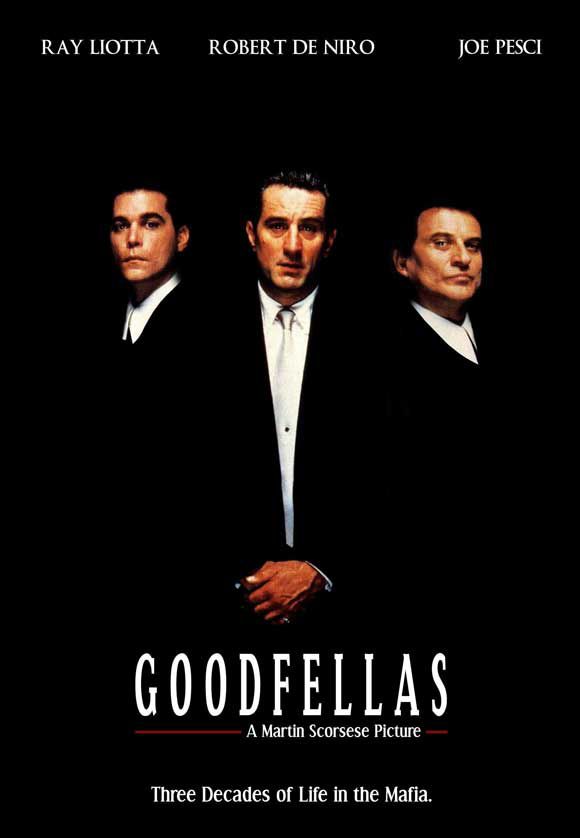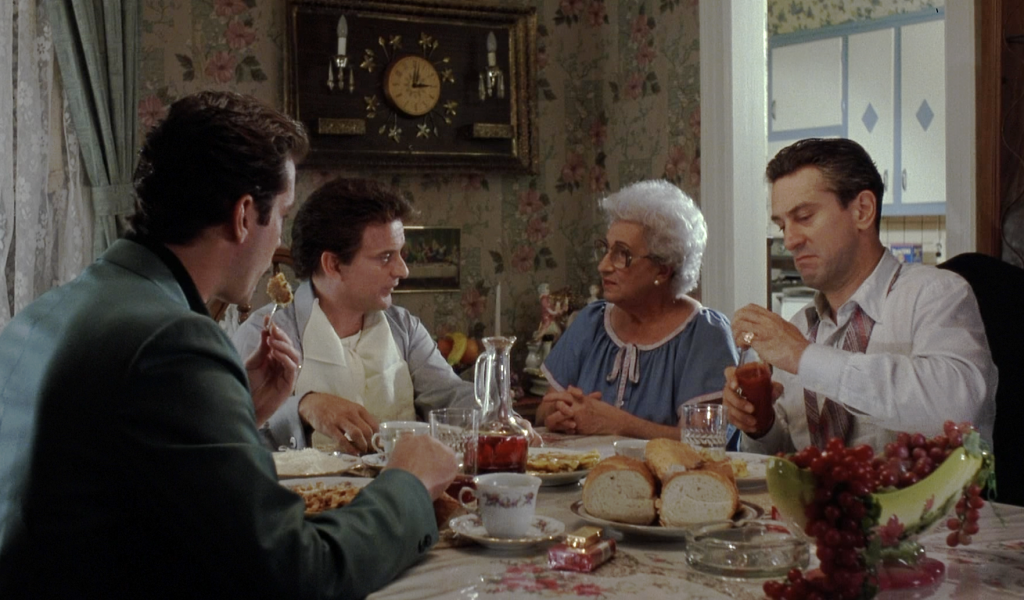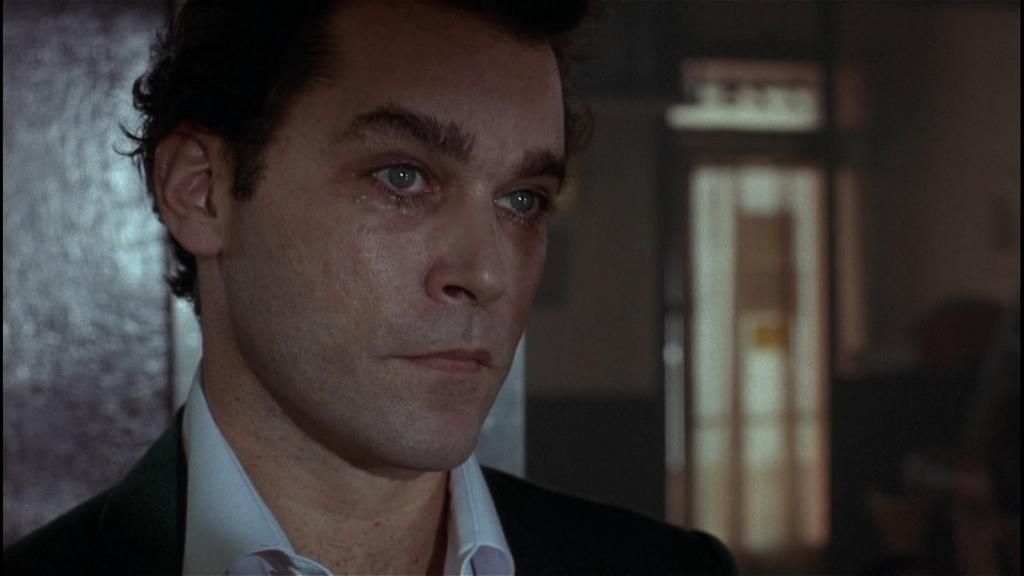Thursday, October 4, 2012
Goodfellas
Goodfellas
1990
Director: Martin Scorsese
Starring: Ray Liotta, Robert De Niro, Joe Pesci, Lorraine Bracco, Paul Sorvino
I’ve seen my fair share of movies, but no matter how many I’ve seen, I’m always deluged with “OMG, you mean you haven’t seen X, Y, or Z yet? What the hell?” when making conversation. Well, one of the biggest X, Y, or Zs that I hadn’t seen was Goodfellas. I am happy to report that I can now cross it off my list, that behemoth of Scorsese’s, that titan of American filmmaking, that huge film. I must say, I feel a sense of accomplishment simply having watched this one.
Henry Hill (Liotta) is growing up in Brooklyn across the street from a gangster-run taxi stand, and he envies their lives. Desperate to join, he is accepted by Pauly (Sorvino) and taken under his wing. He learns the ins and outs of the business, hooks up with a tough chick turned on by the violence inherent in his career (Bracco), and falls in closely with fellow gangsters Tommy (Pesci) and Jimmy (De Niro).
The first hour or so of the story is in stark contrast to the second hour. The movie’s narrative clearly follows the trajectory of Henry’s rise to the upper echelons of the gang, and then chronicles the slow unraveling of his position. Therefore, the two discreet halves of the film feel substantially different. The film reveals Henry’s childhood through flashback, and there is such worship, such reverence in his voice when Henry talks about the life of the gangster. He speaks of them as if they were gods, which, in his head, is an apt comparison.
And to me, that’s the key to understanding Goodfellas. Although it’s a classic gangster picture, I don’t much go in for gangster pictures. I am, however, fascinated with the idea of mythology and how it is constantly reinterpreted by society. Goodfellas is a tale of the mythology of gangsters. There are gods, demi-gods, and mere mortals, all existing in this world where there are no pesky cops getting in the way, just The Organization. The low ones on the totem pole, those hoping to one day be promoted to demi-gods by the Lords on High, the ones with all the power, must play nice and follow the rules. We all know what happened when a mere mortal angered Zeus; there were always repercussions, none of them good; not unless another god stepped in to counter Zeus. Icarus’ wings melted when he flew too close to the sun, after all, plummeting him to his death. This is precisely the same ideology that permeates Goodfellas. Henry Hill is a mortal looking to gain rank with his friends, other mortals Tommy and Jimmy. As the film progresses, I think it easy to make that argument that while Henry flirts with immortality, Tommy never achieves it, all while Jimmy does. Jimmy, through his cunning and paranoia, knows how to kowtow, knows how to play by the rules, and ascends the ranks, ultimately showing, through his power at the end of the film, that he has achieved demi-god status. Tommy shows a blatant disrespect for certain unbreakable rules, and as such, has to be punished by the powers that be in a manner far too akin to Greek mythology to be coincidental. Henry, for his part, is very much like Icarus. He comes dizzyingly close to the sun, but by getting involved with drugs and narcotics, disobeys the rules of the gods and melts his wings. The major powerful god of the film, Pauly, warns Henry against narcotics, but he ignores the warnings, and this causes his downfall.
Apart from a narrative that is truly epic in scope, Scorsese’s camerawork in Goodfellas matches the heady nature of the tale being told. There are two tracking shots in particular that are brilliant; the much-lauded entrance of Henry and his future wife through the basement of the Copacabana, but the scene where Henry is being introduced to member after member of The Organization is brilliant in its timing, combining the tracking scene with Henry’s voiceover. Scorsese is ballsy and brassy in both of these shots, which makes perfect sense in the context of the scenes in questions. These are both celebration scenes of the power to which Henry aspires, reveling in “The Life,” as it were. In these, Scorsese reminds me of a young Orson Welles, so heedless of the rules of “nice” filmmaking, and hellbent on breaking the rules to his advantage. As the film progresses and we turn from Henry’s rise to his fall, the camerawork changes as well. Scorsese becomes more claustrophobic with his angles, and uses much more jittery hand camera work, eschewing the glitzy smoothness of steadicam shots. There is also a brilliant moment at the end where the fourth wall comes crashing down, a moment so unexpected, it caught me completely by surprise. I almost looked over my shoulder to see who the character was talking to. Again, it’s a gutsy filmmaking move, but one that makes perfect sense within the world of Goodfellas.
Realistically, Goodfellas isn’t quite my type of movie, but I am certainly not going to allow that prevent me from proclaiming its brilliance. I think of this, and I think of Dances with Wolves, the film that beat it to the Oscars in 1990, and it’s not even a fair comparison. I think there’s a very clear reason why Goodfellas was named to AFI’s “100 Years, 100 Movies” list, celebrating the best in American filmmaking, and Dances with Wolves was not. Ah, the Oscars. Scorsese can, at the very least, rest assured that his film will be remembered far more than Costner’s. Goodfellas is alternately joyous and devastating, neither of which I anticipate feeling from a gangster movie. This movie is good stuff. Very good stuff.
Arbitrary Rating: 8.5/10
Labels:
1001 movies,
1990,
1990s,
8.5 out of 10,
american,
goodfellas,
scorsese
Subscribe to:
Post Comments (Atom)



Great review. Goodfellas is one of those films I keep putting off, because everything's already been said, or so I thought until I read your comparisons to Icarus, which to my understanding are pretty spot on.
ReplyDeleteAt times I think this film is a bit over-rated - your score is similar to what mien would be - but it is no doubt a great achievement from all involved, and is so very much better than Dances with Wolves, from which I can remember pretty much nothing.
I didn't find it "perfect," at least not in my eyes. But it's definitely a towering film.
DeleteYeah, I saw Dances with Wolves in theaters waaaaaaaaay back in the day, and I was waaaaaaaaaaay too young for it. I remember most the scalping scene because it scared me so much.
I'm one of the minority that doesn't particularly like this movie. Gangster films don't do much for me in general, and this one did nothing for me in particular. Many people say it is the best gangster film ever made. I'll take The Godfather over this any day of the week.
ReplyDeleteHill's character lost me early on when he was telling a story of his childhood. His dad was some big gangster and he told how the kids in the neighborhood would all offer to carry his mother's grocery bags home for her. "That's respect!", he intones. I laughed out loud at this. It wasn't respect; it was kids knowing which side the bread is buttered on and hoping to get something in return, if not then, then later in life.
I think what I liked most was the feeling of exhilaration in the first half of the narrative. This didn't feel like a realistic story of the mob, but a rosy-hued remembrance of what one man considered "the good life."
DeleteI'd take The Godfather over this one too. Godfather's rockin', man.